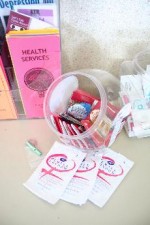STDs are worth discussing

How well do you know the people you have sex with? I mean really know them? Maybe you know their favorite cocktail, sports team, or that they eat pizza three times a week. But how about the last time they were tested for an STD?
It’s something to think about before you hop between the sheets for a midnight mambo. Sexually transmitted diseases, or in PC terms, sexually transmitted infections, are on the rise. The Center for Disease Control reports that 19 million new infections occur every year in America. That’s the equivalent of every person in New York City and Vermont getting an STD, twice.
One in four people living in America will contract an STD during their life. Perhaps more startling is that about half of the people who get an STD are in the 15- to 24-year-old age group, and many of the diseases they’ll get do not cause symptoms initially, according to the CDC.
This means if you live in a suite, statistically two of your suitemates have a STD, even if they don’t have anything “weird” going on.
“I’m very concerned,” said Deb Choma, a registered nurse and director of the Castleton Wellness Center, who is known for her “Sex With Deb” talks with students. Choma said even on our small campus, she has felt effects of the national STD increase, “especially HPV, Chlamydia, and herpes.”
“I see ’em weekly,” she said.
HPV is better known as genital warts. Most infected people don’t show any symptoms, according to the CDC.
Chlamydia infections have tripled since 1990, according to the CDC. It is the most frequently reported bacterial STD and, simultaneously, significantly underreported because most of the people who have Chlamydia are unaware that they have it.
But despite the risks and prevalence, talking about STDs is not high on people’s priority lists.
“We have a societal reluctance to discuss sex,” said Dr. Michael Carey, who has extensively studied human behavior at Syracuse University. “When we do talk about it, we talk about it in a moral way verses a health issue.”
“People don’t want to hear about it because it scares the shit out of them!” said Kara Marshall, a CSC senior. “They don’t want to admit that you might have something.”
Contrary to popular belief, you don’t have to have sex to get an STD. There are two basic ways to contract an STD according to the CDC. The first is to come in contact with infected semen or vaginal fluid. The second is to come in contact with infected skin.
STDs can be transmitted via oral, anal or vaginal contact. Choma said that she even had a student come to her with gonorrhea of the throat.
Gonorrhea is another STD on the rise and it is becoming harder to treat because the bacterium that causes gonorrhea is becoming more resistant to antibiotics. The CDC even dubbed it the “super bug.” The same is goes for syphilis.
While some STDs are curable with antibiotics, some are not. And regardless if they are curable, they may cause larger problems such as cancer and infertility.
Experts agree that best way to protect yourself is to abstain from sex or to be in a monogamous relationship in which both partners have been tested. It’s a conversation sexually active people need to have before they have sex.
Senior Julian DeFelice agrees.
“You always have to talk about it,” he said. “It’s part of living these days.”
Choma said it’s normal to abstain, but for those who don’t, she recommends that females use ‘the pill’ in conjunction with male condoms — every single time. Gay couples and females receiving oral sex should use dental dams.
“I’ve got every color, shape, size, and flavor-even glow in the dark!” said Choma of her dental dam and condom collection. She also distributes condoms to CA’s in the dorms and gives them out for free at the Wellness Center to whoever wants them.
“There’s no excuse when they are free,” she said.
And just because you feel you know your partner, you may not know their former partners.
“People see being in love with their partners as making sex less risky,” said Carey. “But microorganisms don’t respect love.”
Senior Anthony Scott, who is a self proclaimed condom wearing promiscuous 23-year-old, said the rise in STD infections has made him more cautious.
“It makes me a lot pickier . I’ve cut back a lot because I don’t think it’s worth the risk.” Scott gets tested every few months and said he always wears a condom. “You may be safe, but the person you’re sleeping with could be a dirty, dirty whore.”
If You Want More, Check Out.
CSC’s Wellness Center (It’s the gray house next to Huden) EXT: 1346
www.HealthVermont.org
www.cdc.gov/std
Ways to Stop the Spread:
Protect Yourself-every single time!
Get Tested Regularly
If you test positive seek treatment and notify all past partners so they can be treated




